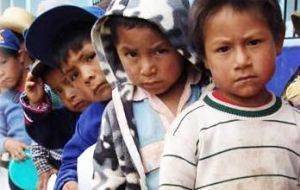MercoPress. South Atlantic News Agency
Latin America has 45% of under 18, equivalent to 81 million living in poverty
 In Uruguay and Chile less than one in four children live in poverty
In Uruguay and Chile less than one in four children live in poverty Almost 81 million children under 18 suffer from poverty in Latin America which is equivalent to 45% of that age group according to a study by the Economic Commission for Latin America and the Caribbean (ECLAC) and the United Nations Children's Fund (UNICEF).
The study “Child poverty in Latin America and the Caribbean” is a diagnosis of the child poverty situation in the region and includes public policy recommendations to overcome the problem, even when the situation is most uneven: in Bolivia, El Salvador, Guatemala, Honduras and Peru, over two thirds of children are poor, but in Chile, Costa Rica and Uruguay, fewer than one in four children live in poverty.
The study, carried out in 2008-2009, took as reference for its conclusions the International Convention on the Rights of Children, which came into force in 1989. The study took into account factors as nutrition, access to drinking water, connection to sanitation services, quality of housing, number of people per room, school attendance and access to information and communication media instruments, because shortcomings on these issues contributes to a recurrent framework of poverty and social exclusion.
The study also considered household incomes and potential capacity of resources to meet basic needs.
In the introduction to the document, written by Alicia Bárcena, Executive Secretary of ECLAC and Bernt Aasen, UNICEF Regional Director for Latin America and the Caribbean, they state that “in order to eliminate the scourge of child poverty, governments must integrate social, employment and macroeconomic policies. This requires allocating greater resources to promote children's rights, providing a protective environment, increasing the provision and quality of services, as well as extending social protection systems”.
In terms of public policy, the report states that overcoming child poverty involves greater investments in opportunities for children and reduction of the ongoing socioeconomic, territorial, ethnic and gender inequalities in all the region's countries. This process must be implemented from the earliest age, so as to break the intergenerational reproduction of poverty.
Finally the document includes multi-sector proposals that should help to address the issue of child poverty, in particular by ensuring the right to food, health, water, sanitation, education and information.




Top Comments
Disclaimer & comment rules-

Read all commentshttp://www.eclac.cl/prensa/noticias/comunicados/0/43450/tabla-comunicado-unicef.pdf
May 18th, 2011 - 04:21 am 0Commenting for this story is now closed.
If you have a Facebook account, become a fan and comment on our Facebook Page!